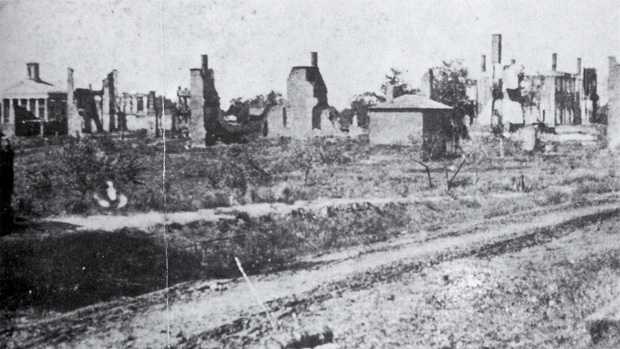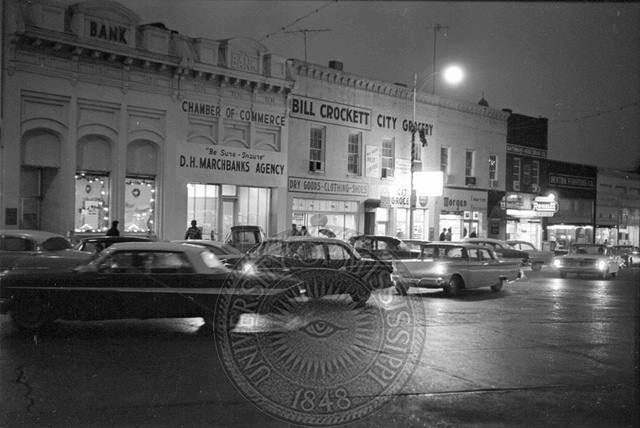
Interview with Civil War historian Starke Miller by Steve Vassallo
Describe the composition of the Square at the time of the War between the States.
The Square consisted of the courthouse, two large hotels, and about 20 stores: grocery, dry goods, and specialty stores.
Prior to the arrival of Union troops, how was Oxford protected (if at all) by Confederate forces?
There were about 3,000 Confederates posted in Oxford in both 1862 and 1864, which were the two major raids by the Yankees on Oxford. General U.S. Grant had 80,000 men on the first raid, and General A.J. Smith had 20,000 in 1864. There was no choice but to retreat.
 Oxford must have been a rather small town in 1861. Why was such an insignificant size community important?
Oxford must have been a rather small town in 1861. Why was such an insignificant size community important?
It was on the Mississippi Central Railroad. It was also the first major town, or county seat, below a defensible river, the Tallahatchie.
What led to the order to burn the town?
In December of 1862, Grant’s supply base at Holly Springs was raided by Confederate General Earl Van Dorn and 2,000 cavalry. Once Grant’s supply base was gone, he realized he could never keep his rear safe. He figured out he would have to get to Vicksburg down the Mississippi River instead. In his anger over losing his supplies, he ordered Oxford burned. But before those orders could be carried out, he countermanded his order. He came to his senses. In August of 1864 A.J. Smith was the third Union General tasked with catching Nathan Bedford Forrest. A few hours after arriving in Oxford, Smith got the bad news that Forrest had slipped around him and raided Memphis the night before. Out of anger Smith then ordered Oxford and the University burned. There were at least 44 towns in Mississippi burned from 1862 to 1864. It was a war of destruction by the North.
Describe the amount of damage.
The train depot, the courthouse, five houses, both hotels, and all the businesses on the Square, except one small brick building, were burned to the ground. This served no real military purpose. At least one church and several other houses were set on fire, but they were put out by townspeople before they could burn completely.

Were there any buildings or churches spared?
Most of the houses in Oxford were spared. A few businesses off the Square were not burned. I have never read of a town in the Civil War where every single building was burned. The University was spared by the two Union Captains who were sent personally by General Smith to burn it. They “refused to carry out such a vandal order.” If their descendants could be found, the University ought to honor them in some way. I do know their names.
We are all familiar with Cedar Oaks. What were the other famous plantation homes at the time that did not survive the war?
Jacob Thompson was an Oxonian who was in President Buchanan’s Cabinet. He was also in the Confederate government at Richmond. He had the largest, finest house in Oxford. The furnishings were from Europe. It sat across the road from present-day Rowan Oak. It was burned in 1864, as was James Brown’s mansion, across the road from the Railroad Depot. It had been Grant’s headquarters in 1862. One of the two Pegues brothers mansions was burned down in 1862, just a mile or two from Oxford.
About how long after the “torching” did it take for the city to rebuild?
Rebuilding was slow to restart. All the military-age men were away. Confederate money was worth very little by the summer of 1864. Building supplies were nearly impossible to get. The rebuilding started after the war. The courthouse was completed in 1872.
When the war officially ended in 1865, how can one best describe the economy and condition of Oxford and status of the University?
Oxford was devastated. Fortunately, due to two Yankee cavalry captains, the University still stood. It was able to immediately reopen in the fall of 1865. That University was never needed more than it was after the war. Those two captains had integrity and guts. The beloved Lyceum still stands there today thanks to them.
This is more of a personal opinion question. What lessons can we learn from the war as this relates to Oxford?
I can only quote Jeremiah Gage, a University Grey, “War is a terrible thing; I hope another one never comes in my lifetime.” ![]()


